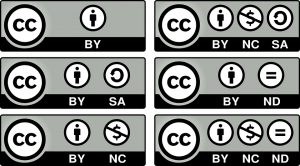5.9 Creative Commons Licensing
We live in an era of reuse, remix, reformat, and repurpose. Sharing content has never been easier, and using existing content in new ways happens all the time. Creative Commons licenses have made legally reusing content online much easier.
Most works are under full, “all rights reserved” copyright. This means that they cannot be reused in any way without permission from the work’s copyright holder. One way you can get permission to use someone else’s work is through a license, a statement or contract that allows you to reuse a copyrighted work in specific circumstances. For example, the copyright holder for a popular book might sign a license to provide a movie studio with the rights to use their characters in a film.[1]
Creative Commons licenses were created to encourage the sharing of resources by making open and shareable materials on the web easily identifiable. They are a type of copyright license that lets the creator dictate the ways anyone else can reuse their work. This helps us understand what we can and can’t do when reusing other people’s work.
Popular sites like YouTube, Wikipedia, and Flickr and many others have used Creative Commons licenses for years.
As a creator, you probably care about how others use your work. Creative Commons licenses can help you share your work but still control how others may use it. For example, do you want to:
- allow others to adapt your work?
- remix and sell it?
- allow your work to be reused or remixed, as long as you still get credit?

There are six different types of licenses available that allow each of these things, and attaching the license to your digital work lets others know how they may use your material. You can explore those on the Creative Commons website. Once you’ve chosen a Creative Commons license for your work, you simply apply the appropriate license on your online work, and visitors will know at once the terms of how you are sharing it.
- Abbey Elder, The OER Starter Kit ↵
